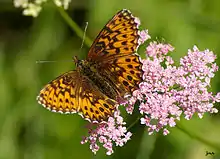| Boloria titania | |
|---|---|
 | |
| Dorsal view | |
_titania.JPG.webp) | |
| Ventral view | |
| Scientific classification | |
| Domain: | Eukaryota |
| Kingdom: | Animalia |
| Phylum: | Arthropoda |
| Class: | Insecta |
| Order: | Lepidoptera |
| Family: | Nymphalidae |
| Genus: | Boloria |
| Species: | B. titania |
| Binomial name | |
| Boloria titania (Esper, 1793) | |
| Synonyms | |
| |
Boloria titania, the Titania's fritillary or purple bog fritillary, is a butterfly of the subfamily Heliconiinae of the family Nymphalidae.
Description
The adult is a small fritillary with typically chequered orange-brown upperside and a marginal row of triangles and dots. The length of the forewings is 21–23 mm. The underside has brown pearly spots and triangular markings at the edge of the hindwings.
Description in Seitz
A. amathusia Esp. (= diana Hbn., titania Esp., dia major Esp.) (68e). Above similar to large specimens of euphrosyne. The hindwing beneath very characteristic, being strongly variegated with purple, its distal band deeply dentate on both sides and bearing purple-brown partly pale-centred dots. In the nymotypical form the forewing beneath also shows at the distal margin pointed teeth which project far on to the disc... In the Alps. — bivina Fruhst. is the eastern European form; smaller, paler, with somewhat thinner lilac markings; darker beneath, the median band of the hindwing more uniformly yellow, not being variegated with red; from Saratow. — In sibirica Stgr.[B. titania ssp. staudingeri Wnukowsky, 1929] (68f) the band occupying the distal area much less deeply and more evenly indented on both sides; from the mountains of South-West Siberia.[1]
 Dosal side
Dosal side Ventral side
Ventral side
Distribution
This species is present in the Palearctic realm[2] from central Europe to Siberia and the Altai. In Europe it forms small isolates in the Alps, southern Finland, Latvia, Poland, and the Balkans.
Subspecies
Biology
The butterfly flies in subalpine meadows from June to August depending on the location. The larvae feed on Viola species, Vaccinium uliginosum, Bistorta major, Filipendula ulmaria and Trollius asiaticus.[3]
Etymology
Named in the Classical tradition. In Greek mythology Titanide, is a daughter of the Titans. Her sisters are Theia, Rhea, Themis, Mnemosyne, Phoebe, and Tethys.
References
- ↑ Seitz. A. in Seitz, A. ed. Band 1: Abt. 1, Die Großschmetterlinge des palaearktischen Faunengebietes, Die palaearktischen Tagfalter, 1909, 379 Seiten, mit 89 kolorierten Tafeln (3470 Figuren)
 This article incorporates text from this source, which is in the public domain.
This article incorporates text from this source, which is in the public domain. - ↑ Fauna Europaea
- 1 2 "Clossiana Reuss, 1920" Archived 2017-03-01 at the Wayback Machine at Markku Savela's Lepidoptera and Some Other Life Forms
- Guide des papillons d'Europe et d'Afrique du Nord, Delachaux et Niestlé, Tom Tolman, Richard Lewington
External links
- Butterflies of Europe (in Dutch)
- euro butterflies
- butterfly guide